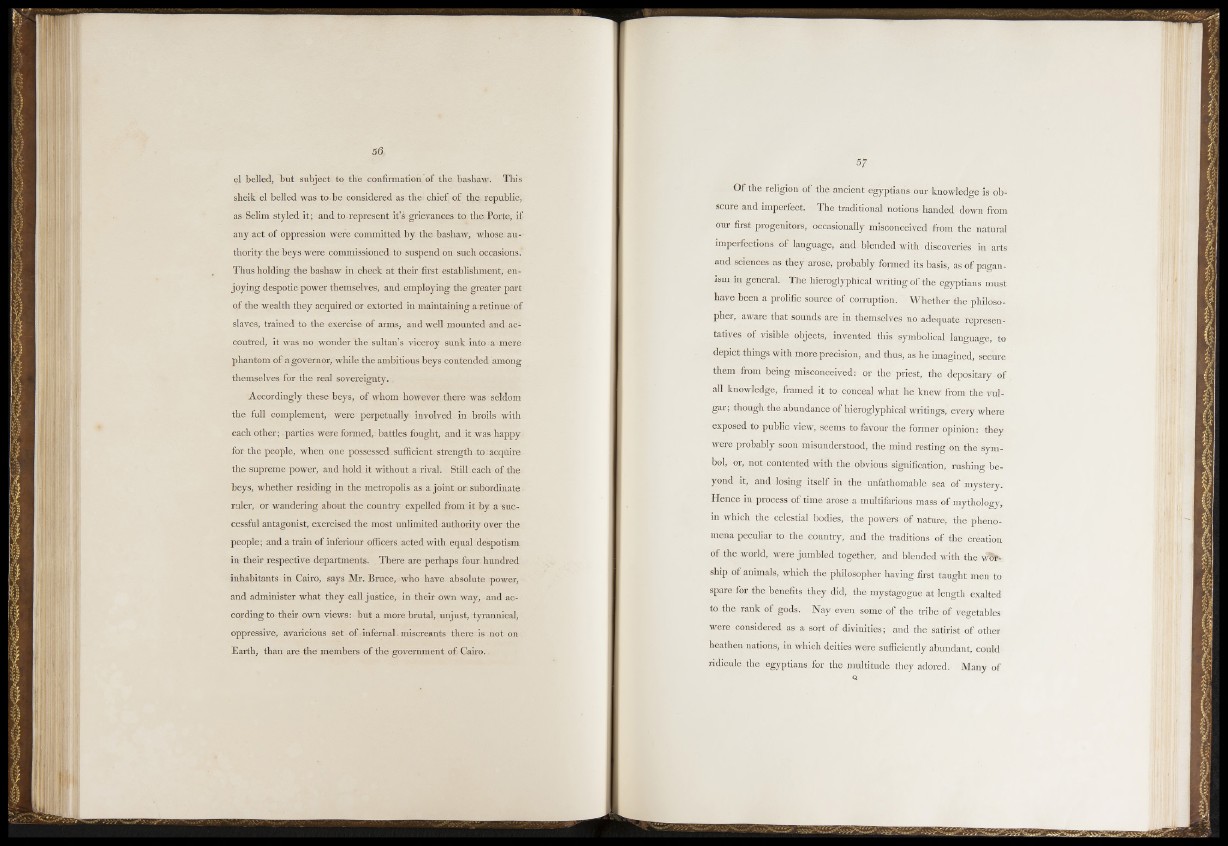
el belled, but subject to the confirmation of the, bashaw. This
sheik el belled was to.be considered as the; chief of the republic,
as Selim styled it; and to.represent it’ll grievances to the Porte, if
any act of oppression were committed by the bashaw, whose au thority
the beys were commissioned to suspend on such occasions.'
Thus holding the bashaw in check at their first establishment, enjoying
despotic power themselves, and employing the greater part
of the wealth they acquired or extorted in maintaining a retinueof
slaves, trained to the exercise of arms, and well mounted and accoutred,
it was no wonder the sultan’s viceroy sunk into a .mere
phantom of a governor, while the ambitious beys contended among
themselves for the real sovereignty.
Accordingly these beys, of whom however there was seldom
the full complement, were perpetually involved in broils with
each other; parties were formed, batdes fought, and:it was happy
for the people, when one possessed sufficient strength to:acquire
the supreme power, and hold it without a rival. Still.each of the-
beys, whether residing in the metropolis as a joint or: subordinate
ruler, or wandering about the country expelled from it by a successful
antagonist, exercised the most unlimited authority over the
people; and a train of inferiour officers acted with equal despotism
in their respective departments. There are perhaps four.hundred
inhabitants in Cairo, says Mr. Bruce, who have absolute power,
and administer what they call justice, in their own way, and according
to their own views: but a more brutal, unjust, tyrannical,
oppressive, avaricious set of infernal.miscreants there is not on
Earth, than are the members of the government of. Cairo..
Of the religion of the ancient egyptians our knowledge is obscure
and imperfect. The traditional notions handed down from
our first progenitors, occasionally misconceived from the natural
imperfections of language, and blended with discoveries in arts
and sciences as they arose, probably formed its basis, as of paganism
in general. The hieroglyphical writing of the egyptians must
have been a prolific source of corruption. W hether the philosopher,
aware that sounds are in themselves no adequate representatives
of visible objects, invented this symbolical language, to
depict things with more precision, and thus, as he imagined, secure
them from being misconceived: or the priest, the depositary of
all knowledge, framed it to conceal what he knew from the vulgar;
though the abundance o f hieroglyphical writings, every where
exposed to public view, seems to favour the former opinion: they
were probably soon misunderstood, the mind resting on the symbol,
or, not contented with the obvious signification, rushing beyond
it, and losing itself in the unfathomable sea of mystery.
Hence in process of time arose a multifarious mass of mythology,
in which the celestial bodies, the powers of nature, the phenomena
peculiar to the country, and the traditions of the creation
of the world, were jumbled together, and blended with the wfo-
ship of animals, which the philosopher having first taught men to
spare for the benefits they did, the mystagogue at length exalted
to the rank of gods. Nay even some of the tribe of vegetables
were considered as a sort of divinities; and tbe satirist of other
heathen nations, in which deities were sufficiently abundant, could
ridicule the egyptians for the multitude they adored. Many of
a